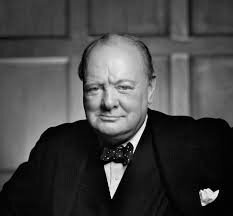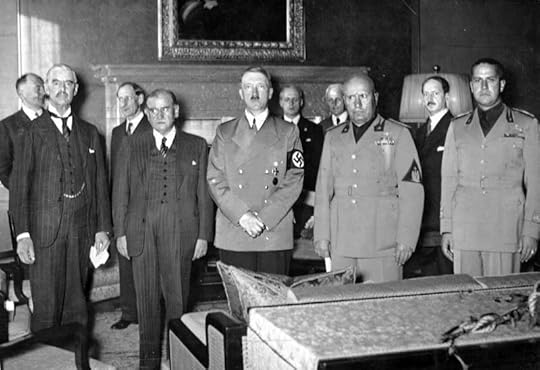Chamberlain's Appeasement Policy and How it failed.

Neville Chamberlain making a speech after the 1938 Munich Agreement
After long deliberations with myself I’ve decided to write a serious of blogs about the political backdrop of my upcoming WW2 novel The Highland Raven (27 September), which will become as a free booklet for the readers of the new book.
IntroductionWhen Hitler came to power in 1933, the British prime minister Neville Chamberlain did everything in his power to appease the German dictator. Had he listened to another voice, that of Conservative back-bencher Winston Churchill, might history have taken a different course?
This is a rhetoric question to which we will never know the answer. But the fact remains that Neville Chamberlain has gone down into the history books as the wrong decision-maker, while Winston Churchill is our forever WW2 hero.


Neville Chamberlain Winston Churchill
Who was Neville Chamberlain?Arthur Neville Chamberlain (18 March 1869–9 November 1940) was the Conservative Prime Minister of the United Kingdom from May 1937 to May 1940. He is most remembered for his foreign policy of appeasement, and in particular for signing the Munich Agreement on 30 September 1938, which accepted that Sudetenland (German-speaking region of Czechoslovakia) became part of Nazi Germany.
When Hitler invaded Poland on 1 September 1939 (the beginning of WW2), Chamberlain declared war on Germany on 3 September and led the United Kingdom through the first eight months of the phoney war. Phoney, because there was no military involvement on the side of Great-Britain and Poland, was left to its own defense. Chamberlain resigned as prime minister on 10 May 1940 and was succeeded by Winston Churchill.

A conference of the League of Nations, which was doomed to fail at some point
The origin of the appeasement policyChamberlain's policy of appeasement stemmed from the failure of the League of Nations (which, by the way, the US never joined despite President Woodrow Wilson’s wish) and the failure of collective security. The League of Nations, set up in the aftermath of WW1, was based on hope. Hope that international cooperation and collective resistance to aggression might prevent another war. Members of the League could count on help from other members if under attack.
The policy of collective security included measures to achieve international disarmament and economic sanctions against an aggressor. It already showed its ineffectuality when confronted by the aggression of Hitler and Mussolini (Remilitarization Rhineland, Invasion of Abyssinia).
Note HB: writing this in 2022, I can't help but feel wry irony. See the shortcomings of the United Nations (among others) at stopping Putin's aggression in Ukraine.
It is important - also in the light of today - to understand that the British appeasement policy wasn't just a whim of a gutless politician.
In the post-Great war era, British appeasement was a popular and pragmatic approach for obvious reasons.
First, the British people wanted to avoid the slaughter of another world war at all costs. No country had suffered more casualties and equipment loss in the WW1 than the British.
Second, the country had an immense empire to rule and simply couldn't afford major rearmament costs.
Third, France, Britain's chief ally in WW1, was also seriously weakened and not ready to take on another war.
Fourthly, the support of other Commonwealth countries in yet another war with Germany was all but certain.
Finally, many Britons sympathized with Germany for various reasons. Whether they felt the country had been treated unfairly following its defeat in 1918, or they admired Hitler's rise to power and approach to getting the economy going after the 1929 Stock market crash.

From left to right: Neville Chamberlain, Édouard Daladier, Adolf Hitler, and Benito Mussolini pictured before signing the Munich Agreement
The Appeasement policy in actionHoping to avoid war, the 1930s Britain’s overall policy comprised allowing Hitler to expand German territory unchecked. Hitler’s expansionist aims began in 1936 when he sent his troops into the Rhineland. Two years later, in March 1938, he annexed Austria.
At the 1938 Munich Conference, many British still believed that by Neville Chamberlain's decision to sign the Munich Agreement and hand over Sudetenland to Hitler, their prime minister had averted war with Nazi-Germany.
However, the Munich Agreement was not greeted with jubilation by one back-bencher in the House of Commons, Winston Churchill who at that point in his career was estranged from government and only one of the few MPs to oppose appeasement of Hitler. He described it as ‘an unmitigated disaster’.
And Hitler didn't adhere to his promise of ‘no more territorial demands in Europe’. As undeterred by the British appeasement, as by his later promises to Stalin. Dictators aren't ruled by agreements of any sorts.
In March 1939, he violated the Munich Agreement by occupying the rest of Czechoslovakia. Six months later, in September 1939, Germany invaded Poland. By then, war with Germany was inevitable, even to the most fervent appeasement supporters.
Appeasement - with hindsight - was defined as 'a policy of one-sided concessions to an aggressor state, often at the expense of third parties, with nothing offered in return except promises of better behavior in the future'.
Prime minister Neville Chamberlain sincerely believed this approach would bring a quicker end to the European crisis, as the Nazis' real demand was a revision of the Treaty of Versailles. He believed that, through negotiating a general settlement for the replacement of that treaty, Germany would again enter peaceful treaty relations with its neighbors.
Winston Churchill's warning against appeasementWhen the Nazis came to power in 1933, Winston Churchill warned against the perils of German nationalism. But the nation and the government, weary of war and reluctant to get sucked into European troubles again, largely ignored the whistle blower and did everything they could to stay out of Adolf Hitler’s way.
Though an important politician in the 1920s, Churchill had by this time become a marginalised voice, easily side-lined by Neville Chamberlain. But Winston Churchill never let go. If he believed in something so he remained the most fervent opposer of appeasement, consistently warning the government of the dangers posed by Nazi Germany. He went further to argue that faster British rearmament could deter the German dictator, and that a readiness to make an early stand against his aggression could halt Hitler’s progress before it was too late.

This map shows the parts of Europe Hitler invaded before WW2 broke out, so what Chamberlain’s Appeasement consented to.
The result of appeasementAppeasement reached its sad climax with Chamberlain's sighing of the 1938 Munich Agreement. Promising it would bring “peace in our time”, Churchill scolded him for “throwing a small state to the wolves” in exchange for a promise of peace. Churchill continued to speak the prophetic words: “You were given the choice between war and dishonor. You chose dishonor and you will have war.”
When a year, peace was shattered by Hitler's invasion of Poland and Chamberlain was forced to declare war, he showed himself unequipped for the daunting task of saving Europe from Nazi conquest.
When the British forces failed to stop the German occupation of Norway in April 1940, Chamberlain lost the support of his Conservative Party. By May 1940, the Allies were losing big time on the Western front, and then on 10 May 1940, Hitler invaded Holland, Belgium, and the Netherlands.
On that very day, Chamberlain formally lost the House of Commons' confidence and there was no other option for him but to resign. Faced with the Nazis’ unstoppable Blitzkrieg across Europe, Lord Halifax, who was assumed to succeed him but being both members of the House of Lords and of commons, refused the premiership. Churchill was the only credible alternative to lead.
Had Chamberlain's appeasement worked, and WW2 had ended before May 1940, history would now probably remember Churchill as an average First Lord with a rather embarrassing role in the failure of the Norwegian campaign. But as history has shown, this failure led to Chamberlain’s fall and Churchill's rise.



